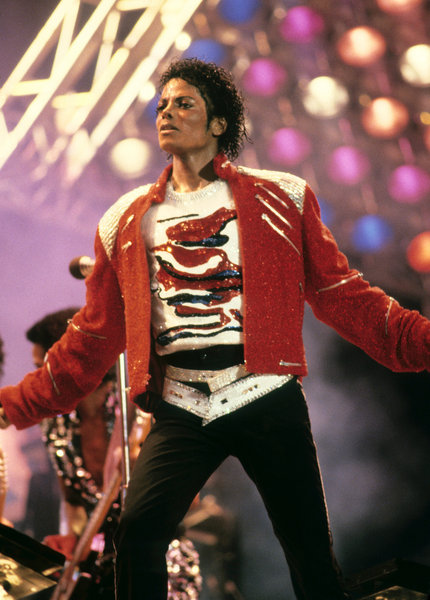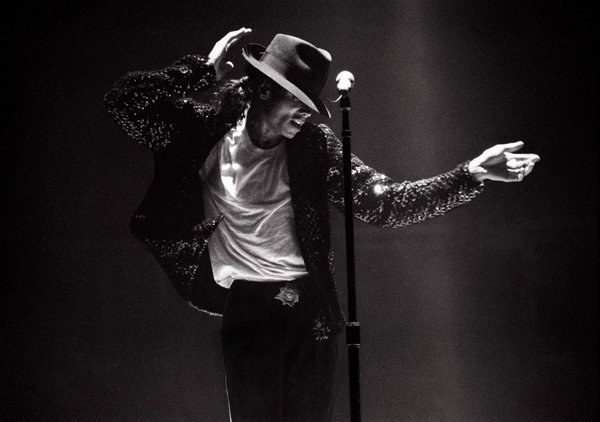1982–1985: "Thriller," Motown 25, "We Are the World" and business career
|

|
|
Michael Jackson [CFP]
|
In 1982, Jackson contributed the song "Someone In the Dark" to the storybook for the film "E.T." and won a Grammy for Best Album for Children. That year Jackson issued his second Epic album "Thriller." The album remained in the top 10 of the Billboard 200 for 80 consecutive weeks and 37 of those weeks at the peak position. It was the first album to have seven Billboard Hot 100 top 10 singles, including "Billie Jean", "Beat It" and "Wanna Be Startin' Somethin'". "Thriller" is often cited as the best-selling album of all time, with worldwide sales between 47 million and 109 million copies.
On March 25, 1983, Jackson performed live on the "Motown 25: Yesterday, Today, Forever" television special, both with The Jackson 5 and on his own singing "Billie Jean". Debuting his signature dance move—the moonwalk—his performances during the event were seen by 47 million viewers during its initial airing, and drew comparisons to Elvis Presley's and the The Beatles' appearances on The Ed Sullivan Show.
Jackson at the White House South Portico with President Ronald Reagan and first lady Nancy Reagan, 1984
Jackson suffered a setback on January 27, 1984. While filming a Pepsi Cola commercial at the Shrine Auditorium in Los Angeles, Jackson suffered second degree burns to his scalp after pyrotechnics accidentally set his hair on fire.
On May 14, 1984, Jackson was invited to the White House to receive an award presented by American President Ronald Reagan. The award was given for Jackson's support of charities that helped people overcome alcohol and drug abuse. Jackson won eight awards of the 1984 Grammy Awards. He donated his $5 million share from the Victory Tour to charity.
1986–1990: Tabloids, appearance, "Bad," autobiography and films
|

|
|
Michael Jackson [CFP]
|
In 1986, the tabloid press ran a story claiming that Jackson slept in a hyperbaric oxygen chamber to slow the aging process; he was pictured lying down in a glass box. Although the claim was untrue, Jackson disseminated the fabricated story himself.
Jackson's skin was a medium-brown color for the entire duration of his youth, but starting in the early 1980s, his skin gradually grew paler. This change gained widespread media coverage, including rumors that Jackson was bleaching his skin.
In the mid-1980s, Jackson was diagnosed with vitiligo and lupus; the latter was in remission in Jackson's case, and both illnesses made him sensitive to sunlight. Changes to his face were, in part, due to periods of significant weight loss. Jackson lost weight in the early 1980s because of a change in diet and a desire for "a dancer's body".
With the industry expecting another major hit, Jackson's first album in five years, "Bad" (1987), was highly anticipated. "Bad" had smaller sales than "Thriller", but was still a substantial commercial success. As of 2008, the album sold 30 million copies worldwide, including eight million shipments in the US.
The Bad World Tour began on September 12, 1987, and finished on January 14, 1989. In Japan alone, the tour had 14 sellouts and drew 570,000 people, nearly tripling the previous record of 200,000 in a single tour. During the trip he invited underprivileged children to watch for free and gave donations to hospitals, orphanages and other charities.
In 1988, Jackson released his first autobiography "Moon Walk," which took four years to complete. Jackson told of his childhood, his experience in The Jackson 5 and the abuse he suffered as a child. He also spoke of his plastic surgery and the change in the structure of his face. "Moonwalk" reached the top position on The New York Times best sellers' list.
In March 1988, Jackson purchased land near Santa Ynez, California to build Neverland Ranch at a cost of US$17 million. The 2,700-acre (11 km2) property had Ferris wheels, a menagerie, and a movie theater. A security staff of 40 patrolled the grounds.
actress and friend Elizabeth Taylor nicknamed Jackson the "King of Pop" when she presented Jackson with an "Artist of the Decade" award in 1989, proclaiming him "the true king of pop, rock and soul". President George H. W. Bush presented the singer with The White House's special "Artist of the Decade" award in recognition of Jackson's musical influence in the 1980s.
From 1985 to 1990, Jackson donated US$500,000 to the United Negro College Fund, and all of the profits from his single "Man in the Mirror" went to charity.